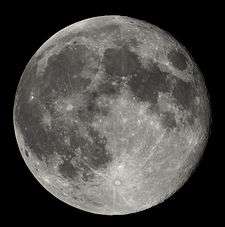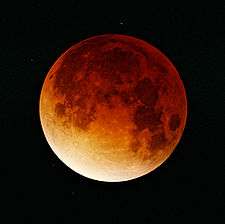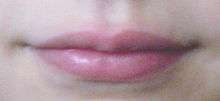Definify.com
Definition 2026
Mond
Mond
Central Franconian
Alternative forms
- Muund (rare variant in Moselle Franconian)
Etymology
From a conflation of Old High German māno and mānōd.
Pronunciation
- IPA(key): /mɔːnt/
Noun
Mond m (plural Mond or Monde)
- (most dialects) moon
- Wa’ mer naachs em Bösch es, süht mer, wie **** der Mond schengk.
- When you’re in the forest at night, you see how bright the moon shines.
- Wa’ mer naachs em Bösch es, süht mer, wie **** der Mond schengk.
- (most dialects) month
- Ich hann allt drei Mond nur der halve Luhn jekräje.
- I’ve been paid just half my salary for three months now.
- Ich hann allt drei Mond nur der halve Luhn jekräje.
German


Etymology
From Old High German māno, from Proto-Germanic *mēnô (whence also Dutch maan, English moon, Swedish måne, Icelandic máni). Ultimately from Proto-Indo-European *mḗh₁n̥s. See also Monat.
Further Indo-European cognates: Latin mēnsis (“month”), Ancient Greek μήν (mḗn, “month”), Sanskrit मास (māsa, “moon”), Russian месяц (mésjac, “moon; month”), Lithuanian mėnulis, Persian ماه (māh, “moon, month”), Tocharian A mañ
Pronunciation
- IPA(key): /moːnt/
Proper noun
Mond m (genitive Monds)
- (astronomy) The Moon; Earth's only natural satellite, and also a luminary.
- Der Mond ist so massereich, dass Erde und Mond zusammen häufig als Doppelplanet bezeichnet werden.
- The Moon has such an enormous mass that Earth and Moon are often considered as a binary system.
- Der Mond ist so massereich, dass Erde und Mond zusammen häufig als Doppelplanet bezeichnet werden.
Noun
Mond m (genitive Monds, plural Monde)
- (astronomy) A moon, a natural satellite that is orbiting its corresponding planet
- Ganymed ist der größte Mond des Sonnensystems. — Ganymede is the biggest moon of the Solar System.
- Merkur und Venus haben keine natürlichen Monde. — Mercury and Venus do not possess natural moons.
- (literary, dated) A month, especially a lunar month
- (heraldry) moon (often used to describe a crescent)
Declension
Old Declension: This old declension is not used anymore, but was up until the end of the 18th century.
Hypernyms
Hyponyms
Synonyms
Derived terms
|
|
Related terms
See also
Luxembourgish
Etymology
From Old High German mund, from Proto-Germanic *munþaz.
Pronunciation
- IPA(key): /mont/
Noun
Mond m (plural Mënner)
mond
mond
Dutch

Pronunciation
- Rhymes: -ɔnt
- IPA(key): /mɔnt/
Etymology 1
From Old Dutch mund, from Proto-Germanic *munþaz, from Proto-Indo-European *ment-. Compare Low German Mund, West Frisian mûn, German Mund, English mouth, Danish mund. See also muide.
Noun
mond m (plural monden, diminutive mondje n)
Derived terms
See also
Etymology 2
From Old Dutch *munda, from Proto-Germanic *mundō.
Noun
mond f (plural monden, diminutive mondje n)
- (obsolete) hand
Related terms
Hungarian
Etymology
From Proto-Uralic *mënᴈ- + -d (“frequentative suffix”). [1]
- Note: The protoform is listed as *mȣnɜ- (*monɜ-) (“to say”) on Uralonet. [2]
Pronunciation
- IPA(key): [ˈmond]
- Hyphenation: mond
Verb
mond
Conjugation
| Infinitive | mondani | |||||||
|---|---|---|---|---|---|---|---|---|
| Past participle | mondott | |||||||
| Present participle | mondó | |||||||
| Future participle | mondandó | |||||||
| Adverbial participle | mondva | |||||||
| Potential | mondhat | |||||||
| 1st person sg | 2nd person sg informal | 3rd person sg, 2nd person sg formal |
1st person pl | 2nd person pl informal | 3rd person pl, 2nd person pl formal |
|||
| Indicative Mood | Present | Indefinite | mondok | mondasz | mond | mondunk | mondotok or mondtok |
mondanak |
| Definite | mondom én téged/titeket mondalak |
mondod | mondja | mondjuk | mondjátok | mondják | ||
| Past | Indefinite | mondtam | mondtál | mondott | mondtunk | mondtatok | mondtak | |
| Definite | mondtam én téged/titeket mondtalak |
mondtad | mondta | mondtuk | mondtátok | mondták | ||
| Conditional Mood | Present | Indefinite | mondanék | mondanál | mondana | mondanánk | mondanátok | mondanának |
| Definite | mondanám én téged/titeket mondanálak |
mondanád | mondaná | mondanánk | mondanátok | mondanák | ||
| Subjunctive Mood | Present | Indefinite | mondjak | mondj or mondjál |
mondjon | mondjunk | mondjatok | mondjanak |
| Definite | mondjam én téged/titeket mondjalak |
mondd or mondjad |
mondja | mondjuk | mondjátok | mondják | ||
| Conjugated Infinitive | mondanom | mondanod | mondania | mondanunk | mondanotok | mondaniuk | ||
Derived terms
(With verb prefixes):
|
|
|
(Expressions):
References
- ↑ Gábor Zaicz, Etimológiai szótár: Magyar szavak és toldalékok eredete, Tinta Könyvkiadó, 2006, ISBN 963 7094 01 6
- ↑ Entry #570 in Uralonet, online Uralic etymological database of the Research Institute for Linguistics, Hungarian Academy of Sciences.